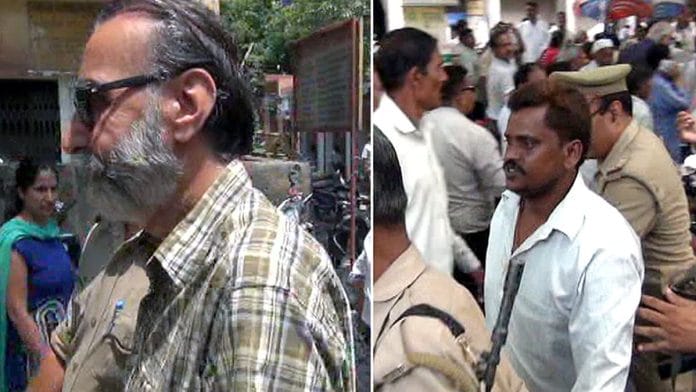Noida: “God is the greatest judge,” a 63-year-old Nithari resident mumbled as he ironed clothes at a stand under a tree. His wife wiped off tears as a gaggle of mediapersons surrounded them.
Their daughter — all of 10 years old when she went missing in 2006 — was one of the children suspected to have been butchered in Nithari as part of a spate of killings targeting women and children in 2005-2006.
On Monday, the two accused — Surinder Koli, a domestic worker, and his employer Moninder Singh Pandher — were acquitted in most of the cases by the Allahabad High Court for want of evidence.
The CBI had initially filed 19 cases, of which it filed a closure report in three. Of the 16 cases against him, Koli was acquitted in 12 Monday. He was let off in three earlier, and has been sentenced to death in the remaining case.
Pandher was acquitted in two cases Monday, which made him a free man since he was let off in the four other cases against him earlier.
Speaking to ThePrint, the presser said he was dumbfounded by the acquittals.
“When I came to iron clothes, I saw mediapersons gathered here. They told me about the Allahabad High Court judgment,” he said. “I was shocked. How can they acquit them?”
He is far from alone. The verdict has left several families of the alleged Nithari victims feeling shocked, angry and disappointed.
These include a local shop-owner whose 5-year-old son had gone out to buy juice when he ran into the predator. On Monday, she couldn’t take her eyes off the TV after the judgment came in.
As she sat outside her shop in Nithari village — the establishment closed to customers — her neighbour asked, “How many times will you watch it? The judgment won’t change.”
Speaking to ThePrint, the shop owner said she searched for her son for months before the skeletons were found outside the house of the accused — her son’s case was among those in which the accused were acquitted earlier but she was at peace, she said, because police had told her the duo had been sentenced to death in other cases.
“I don’t trust the courts anymore,” she said. “The court has deceived us. We are poor people while the accused is rich and that’s why the judgment has come in his favour.”
Also Read: From Raman Raghav to Cyanide Mallika, a look at India’s most notorious serial killers
‘I feel defeated’
The Nithari killings came to light in December 2006, when children were reported missing in the area and skeletons were later found in a drain near Pandher’s house, which abuts the village.
The presser told ThePrint he filed a missing person’s complaint for his daughter in 2006. A year and a half later, he added, he found her clothes in the house where the accused lived, when he visited it after their arrest.
As the families grapple with their loss, the broader implications of the judicial system’s failures come to light, raising questions about the integrity of courts and the need for reform in how justice is administered.
“I have been fighting the case for the past 17 years,” he said. “I have been to police stations, CBI, courts, but today, I feel defeated,” he added.
“The men confessed to the police that they have committed the murder of our children. The police have the video. I saw the video. Was it not enough?” he said.
Losing her 5-year-old son, meanwhile, left the Nithari shop owner in a state of constant panic where she doesn’t let her other children go anywhere unaccompanied.
She drops her three other children to school in the morning, picks them up in the afternoon, and also accompanies them to tuition classes.
“We have not been able to forget what happened to our son. Since then, no one in our family goes anywhere alone,” she said.
‘Khooni haveli, bhootiya ghar, bacha chor’
A crowd gathered outside “D5” — Pandher’s house, where the killings are suspected to have taken place — after the HC judgment came in, and fervent discussions began on the acquittal.
The house, deserted and dilapidated, is covered with bushes and shrubs. The drain outside, where the skeletons were found, is covered in filth.
Since the incident came to light, the bungalow has earned many names. For some, it is “khooni haveli (bloody palace)”, while for others it is “bhootiya ghar (haunted house)” or the “bacha chor ka ghar (house of the child thief)”.
Under the shade of a colourful umbrella, outside the house, Manjeet Mandal, 37, sat sewing clothes. On a tree behind him hung an image of Hindu deity Hanuman.
When Mandal came to Nithari last year from West Bengal, he was unaware of the killings, he told ThePrint. He learnt about them only when he went out asking local residents why no customers were turning up at his sewing stall.
“When a shopkeeper told me about the killings, I went home and saw the YouTube videos. I couldn’t come to work for a week until I gathered courage.” he said. “Then I brought the poster of Lord Hanuman.”
The Nithari shop owner’s neighbour said she and her family had long ago stopped taking the road that runs by the house, and they instead took the longer route to reach the main road.
“I have heard that, in the night, children ask for help,” she said, crossing her fingers. “It’s scary. The road is forbidden for our family.”
(Edited by Sunanda Ranjan)
Also Read: Serial killers and gore now have a growing base in India — on Netflix, Instagram, Spotify






